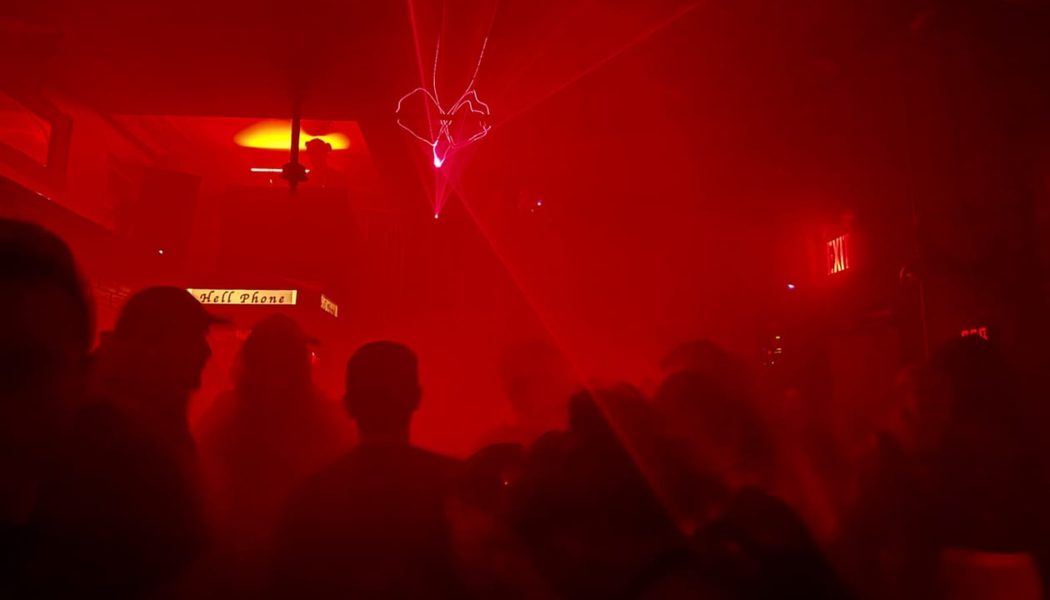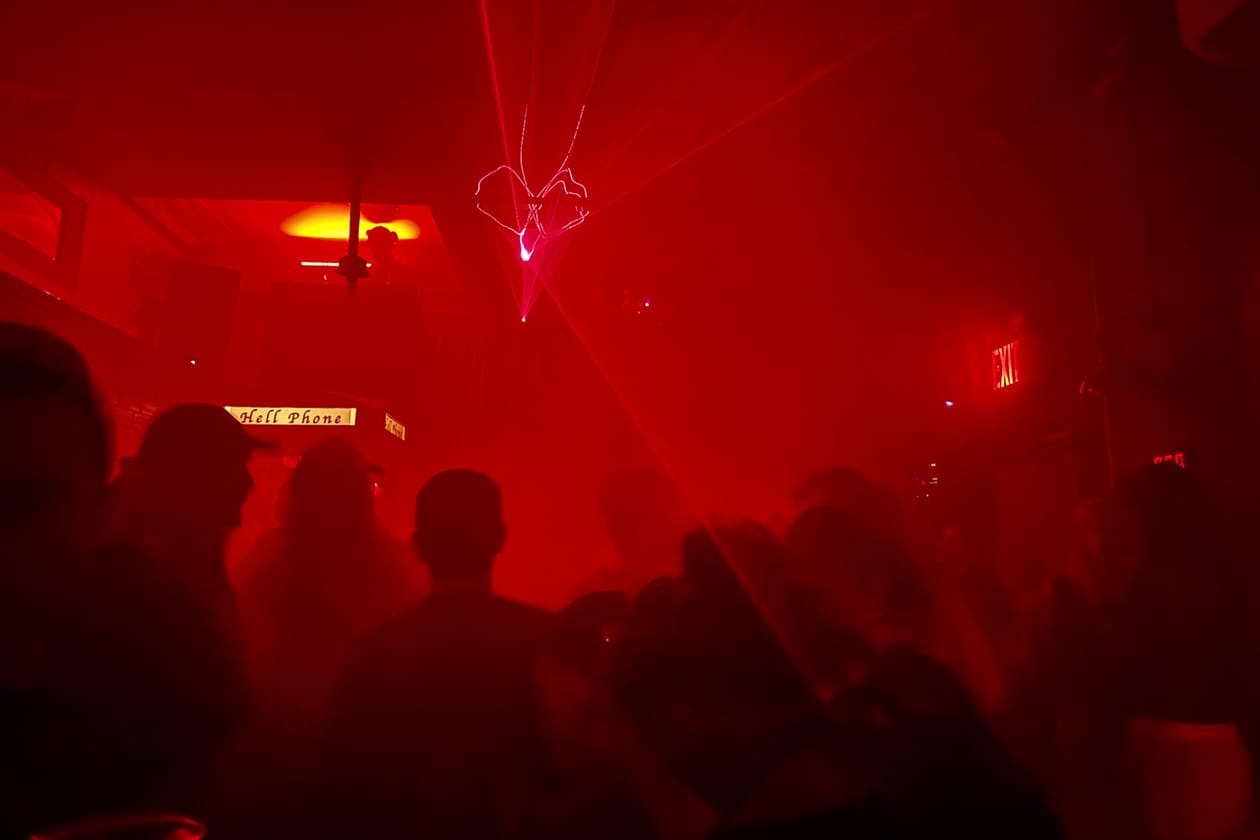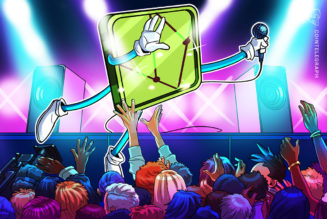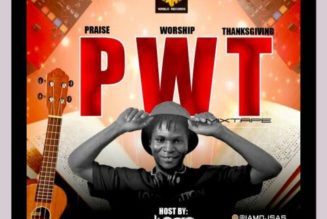It’s 12am on a Saturday night in Bushwick, Brooklyn and the backroom of Ange Noir Cafe has been transformed into Hell. It’s dark, illuminated by a just few red-hued bulbs. A crowd occupies the floor, many of whom are dancing, some waiting for drinks or playing a round of pool. Others filter in and out of the room through an old-fashioned phone booth emblazoned with the words “Hell Phone.” A DJ is perched in the corner of the room a good 20 feet off the floor – their floating presence mimics that of an angel or a devil, depending on your perspective.
Hell Phone, launched only six months ago, may have a strong name but its identity is amorphous. Founders Bree Olsson and Finlay Mangan refer to it as a “techno speakeasy,” though, more broadly speaking, it’s a DIY “multi-use space” for live music. There’s no consistent weekly schedule but events take place typically three nights a week and the founders will share the upcoming roster on the Hell Phone Instagram at the beginning of each week.
Last summer, Ange Noir Cafe owner Vanessa Pacini put a call out for a DJ for a weekly residency, having already been renting out the backroom for variety shows, local theater and private events. Olsson – a full-time DJ, booker and event organizer – came in to interview with Pacini about the role and proposed her own concept for the space.
“I was like, ‘Instead of a residency, like, let me throw you a grand opening, so we can get it on the radar and more people will hear about it,” Olsson reminisces.
One of the space’s defining features is the aforementioned phone booth separating the coffee shop from the backroom — the passageway to Hell, if you will. Constructed in 2014, the portal was created to give the back room a more defined identity from the front.
“Ange Noir means ‘Black Angel’ in French,” Pacini tells Hypebeast. “With angel, we thought of daytime, so we had it in mind to do the opposite, something darker… but we thought that we shouldn’t really put ‘devil’ in the name. That’s how we settled on Hell Phone”
Hell Phone was already the darker, grittier counterpart to Ange Noir, so it felt natural to extend the name to the newfound speakeasy. Olsson brought on Mangan, a full-time model (and her roommate), to bring Hell Phone to life. Alongside Pacini, the two renovated the space to provide a nightclub vibe, starting by installing soundproofing panels and the walls and covering up the skylights to make it darker. They also removed some of the furniture to open up the dance floor.
DJs performing at Hell Phone can play on a standard stage, raised about five feet, or on the smaller, single-person stage that’s nearly ceiling height. “It’s kind of an old-school club idea to tuck the DJ away,” Mangan explains. “The lower stage feels more social to me.”
Olsson and Mangan tapped into their personal and professional networks to book talent, as most Hell Phone DJs are local to Brooklyn and Queens. The duo notes that artists are often drawn to the space itself, a refreshingly intimate environment (with a capacity of about 75) compared to clubs in Manhattan, which can often hold hundreds, if not thousands, of attendees. Lot Radio resident Amelia Holt is a recurring name on the roster, as is the Queens-hailing Purdy and the classically-trained flutist-turned-DJ Concrete Husband. On the Saturday Hypebeast visited, Hell Phone was taken over by two Brooklyn collectives: one called Trim, which curates techno parties around the city, and another entitled Shift, a label that promotes DJs, events and clubs. The collectives are collaborating every month as Hell Phone’s first informal DJ residency. Naturally, Olsson and Mangan have also appeared on the venue’s roster.
Olsson says that most evenings center around techno, though they’ve truly embraced the aforementioned concept of a “multi-use space.” The cafe portion of Ange Noir won’t be operating, though the space itself remains open for guests to sit down and take a breather from the booming music. Local vendors – ranging from vintage resellers to tarot readers to tooth gem artists – will frequently take up shop in the front and Hell Phone doesn’t take a cut of sales. While music is definitively the bread and butter of Hell Phone, later in the week, Holt and another DJ, Cole Evelev, will be utilizing the venue to host a chess club.
“It’s the ethos of Hell Phone to be community-minded, not profit-first,” Mangan says. “We’re driven by wanting to add something meaningful to this scene that we love. Diversify the scene of places that you can go dance is quite cool.”
For Olsson – who spent years in the music industry herself before starting Hell Phone – the safety of artists and guests was just as much of a priority as the music. Some nights are dedicated to providing a safe space for a specific group, such as “Trans 4 Techno,” which presents a lineup composed entirely of trans artists and seeks to bring trans and queer people together.
“There’s a very community-focused vibe. Sometimes it simply feels like a house party here.”
“A great beauty of ours is that everyone here is a friend of a friend,” Mangan adds. “There’s a very community-focused vibe. Sometimes it simply feels like a house party here.”
Even in the winter season, when clubbing in the city naturally decelerates, Hell Phone is still drawing a crowded room most nights. It’s taken off far beyond the expectations of the three founders. And while they have discussed the possibility of bringing Hell Phone to other venues in the future – whether in the city or outside of it – Ange Noir will always remain its home.
“We’re a community-forward place and we love being involved in this scene in Bushwick,” Olsson says. “There’s nothing more rewarding than watching Hell Phone grow.”










